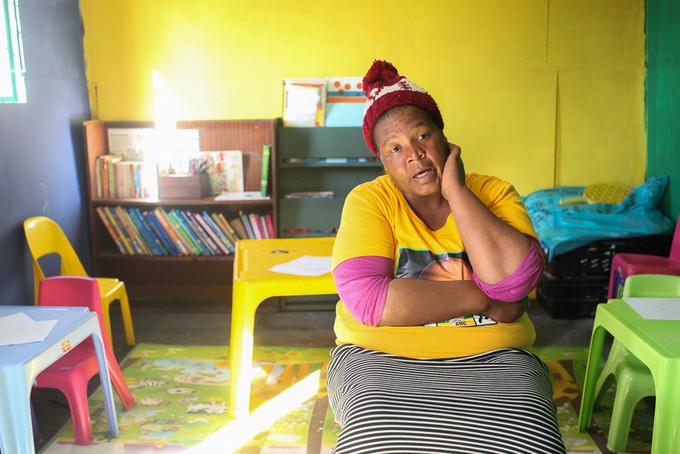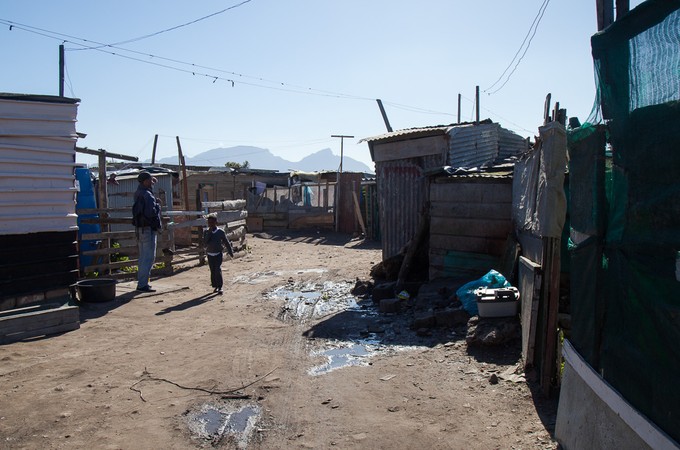
Patricia Masizana opened the first creche in Jim se Bos last year. Photo: Ashraf Hendricks
16 August 2016
Jim se Bos, also known as Olieboom, is an area located outside Mitchells Plain close to the Philippi Horticulture area. It has been there for 19 years according to the City of Cape Town and still has no electricity or proper sanitation. Residents struggle to reach health facilities and schools.
Patricia Masizana has been living in the community for over 15 years and says they are faced with many problems. She opened the first crèche in the community in November last year and has enrolled 27 children.
“Most of the children never went to school. Some if lucky would go and start grade 1 with no pre-schooling which would delay some children. Most people are unemployed and the schools are far, hence some parents see no need in sending children to crèche.”
“The schools are far, children have to cross the main road to go to the closest school in Lotus River and it is not safe. There is private transport for R75 a week but not all parents can afford that,” said Masizana.
Western Cape Department of Education spokesperson Jessica Shelver said in terms of policy, the WCED provides transport to learners from poor communities who live more than five kilometres from their nearest school, where public transport and hostel accommodation are not available.
She said the department is still investigating the problem with Jim se Bos.
Masizana says the struggle for children to get to school is just one problem. Another is accessing health care. “It is difficult for people who are sick because we have to walk to the main road to catch a taxi for R10.50 a single trip … and it drops you halfway. You still need to walk to Klip Road clinic in Parkwood if you do not have the money to catch another taxi for R7.”
“Think about those with TB who have to go to the clinic everyday for treatment. How much are they spending and where will they get the money?” asked Masizana.

Priya Reddy, spokesperson for the City of Cape Town explained that the Philippi and Klip Road Clinics are the two nearest fixed facilities, but there is also a clinic at a satellite facility in Pelican Park twice a week. “The construction of the new Pelican Park Clinic will also bring a primary health care facility closer to the community,” she said.
“City Health also purchased new mobile vehicles in the last financial year. These still need to be fitted with equipment and once this has been completed, the mobile clinics will be used to conduct outreach visits in the area in question and surrounds, which will also improve access,” said Reddy.
Another resident Xoliswa Blaauw, who lives with her three children, said that there were just 20 shacks when she moved into the community 16 years ago. “We live with no electricity and no proper toilets. We are human beings and deserve flush toilets but every time we are told this is private land. To get water you have to walk to the beginning of the community. That’s where you will find taps.”
“Without electricity there is fire, because some people would forget to switch off a candle especially if it’s weekend and people have been drinking,” said Blaauw.
Reddy says the settlement is situated on privately-owned land and the City is prohibited from providing these services on private land without the permission of the land owner.
The area has 360 households. There are six standpipes, nine taps, 53 chemical toilets, 82 container toilets with an addition of 208 portable flush toilets have been provided to those who have requested them according to the City. Some of the toilets do not work and Masizana says some of them have never worked.
“Some of these toilets were old when they arrived here. They just put them here and we were told they came from another community. Some do not have doors. Who do they think will use those because they are on the main road? Who will sit in an open toilet?” asked Masizana.
She says those without chemical toilets are forced to use the container toilets but it is very dangerous at night because there are no street lights.
The City cannot put in lights on private land. Reddy also said that another constraint is that the land is outside the urban edge and zoned for rural use. She said that a “relocation of the settlement would be the most ideal future option.”
There are currently no plans by the City to buy the land from the owner.